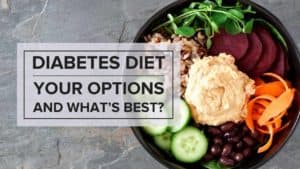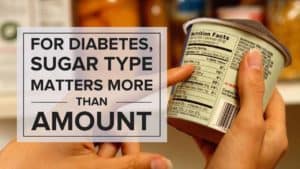There’s a lot of hype around the keto diet these days, especially for people living with diabetes. But in this article, we'll explain why this is the exact opposite of what you should be doing for your diabetes health and overall health!
As it turns out, keto can actually drastically increase the underlying causes of diabetes, turning your health into a ticking time bomb. Meanwhile, low-fat diets high in natural carbohydrates (which many people are very afraid of) have been proven to lower your blood sugar levels and improve other health markers.
We'll explain some of the common misconceptions around these two macronutrient strategies below!
The Current Fad of The High Fat Diet
One of the most popular global diet trends of the past decade has been low-carb, high-fat diets.
And it's understandable why! First of all, high-fat diets include lots of foods that people love to eat, like bacon, steak, and coconut oil.
Secondly, they were backed by some persuasive claims - like how eating fat can actually make you lose weight (without making your blood sugar levels go up).
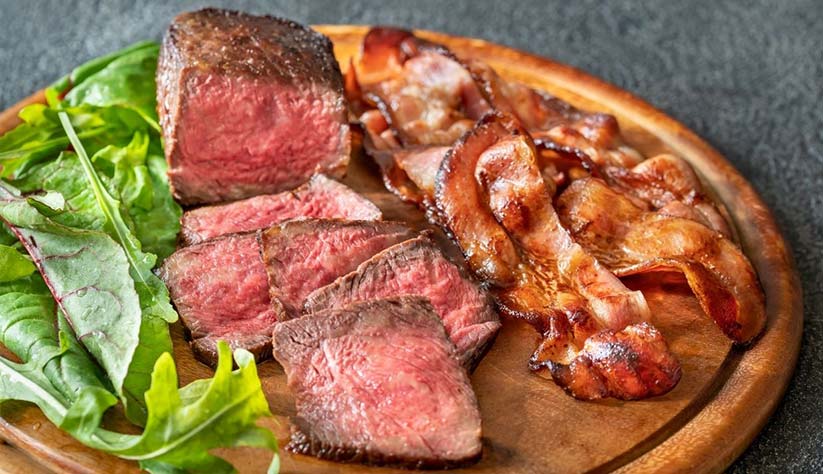
Finally, the low-carb aspect of this diet was popularized as a way to lower insulin requirements and blood sugar in people with diabetes.
Unfortunately, this has led most people with diabetes to wrongly believe that a high-fat diet will help them improve their health in the long term.
It's true that many people who are overweight or obese have seen fast weight-loss results with this approach, but these diets can be a disaster in the long term. In fact, they're actively harmful to people living with diabetes, and can even cause diabetes in healthy people.
What Diets Include High Fats?
Some of the most popular high-fat diets are the Atkins diet, the ketogenic diet, and paleo diet.
These diets include lots of high-fat meats like bacon and beef steaks as well as cheese, coconut oil, heavy cream, butter/ghee/ lard, and other high-fat foods, and eschew carbohydrates like bread, pasta, rice, fruits, and many grains.

Why This Diet Doesn't Work for People With Diabetes
There are definitely some parts of these high-fat diets that are good for you! Almost all of them focus on reducing your intake of processed foods, simple sugars, additives, and artificial flavors, which increase your risks of all-cause mortality.
But where they go wrong relates to the underlying causes of diabetes.
The True Cause of Type 2 Diabetes Complications: Insulin Resistance
The central complication in diabetes is an elevated blood glucose level (also known as your blood sugar level). This is what causes the initial symptoms of diabetes -- polyuria (excessive urination), polyphagia (excessive thirst), and polydispia (excessive hunger) -- and can cause more serious complications of diabetic ketoacidosis and diabetic shock.
But these elevated blood sugar levels are actually caused by a condition called insulin resistance.

When your blood glucose levels go up, your body produces insulin, which is a signal hormone that tells your cells "hey, accept some glucose and use it for energy!"
But if you have insulin resistance, which is the buildup of dietary fat in cells that are not meant to store it, your cells don't respond to insulin quickly, instead choosing to try to burn through that extra fat.
As a result, the glucose/sugar in your blood doesn't have anywhere to go, causing your blood sugar levels to rise.
Why The High Fat Diet Produces Deceptive Short Term Results
There are two reasons that the high-fat diet produces deceptive short term results if you have type 2 diabetes: weight-loss and a lack of glucose in your blood.
The high-fat diet has been shown to produce weight loss quickly, and in general, the more weight you lose, the lower your blood sugar levels will be, at least to a point.
By itself, this would be a good thing, but the second deceptive result can be outright dangerous.
By definition, if you stop eating carbohydrates in favor of high-fat foods, there will be less glucose in your blood. This causes your levels to fall, which might seem like a good thing at first.
But by increasing your fat intake, you're drastically increasing your insulin resistance.
This means that when you do eat whole carbohydrate rich foods again, your body will have a very difficult time using insulin to get the glucose into your cell.
So you've gotten quick, tasty results, but created a ticking time bomb for your health.
That's why the actual answer is a specific type of low fat diet, one that takes the good parts of keto, paleo, or Atkins, and combines them with a diet rich in low-fat foods like fruits and vegetables.
Why Are People Afraid of Low-Fat, High Carb for Diabetes
Now, when you pitch a "high-carb" diet for people living with diabetes, you likely get a few strange looks! After all, this is the opposite of what people have been told for decades.
And yes, there are some potential problems with a high-carb diet if you don't plan it right! We'll explain a bit more below.
Blood Sugar Levels
Many people are afraid of a low-fat diet because glucose (the byproduct of all carbohydrates) is what you measure when measuring diabetes. So shouldn't you avoid all glucose to keep your blood glucose low?
Actually, no! Because even though glucose is the nutrient that gets stuck in your blood, the real problem here is your fat intake. Over time with the right carbohydrates, your cells are able to burn through that insulin resistance, and process those healthy carbohydrates normally!
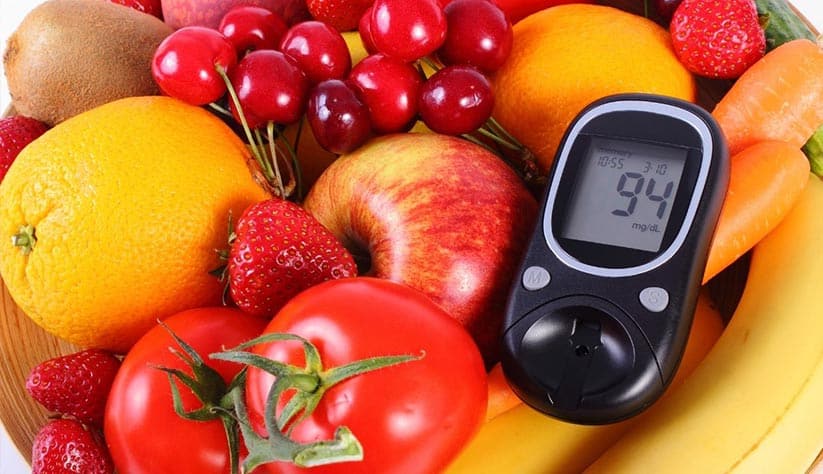
The Misconception Around Glycemic Index
Another reason that people are afraid of a low-fat diet is a misconception around the Glycemic Index. The Glycemic Index is a measure of how fast your blood sugar will spike after ingesting certain types of foods.
This is a very helpful tool if you're living with diabetes, because you're able to understand which foods will cause blood sugar levels to rise, and by how much but the problem is that people assume you need to avoid foods with a high Glycemic Index.
However, just because something has a higher GI doesn't mean it's not healthy! Low-fat whole grains have been shown in multiple studies to benefit people living with diabetes by reducing insulin resistance and helping their cells process glucose normally. And yet, they're higher on the glycemic index.
Fruits like watermelon and bananas are similar -- great for reducing insulin resistance, but high on the Glycemic Index.
The Very Real Threat of Simple Carbohydrates
The final reason people are afraid of low-fat diets is due to a very real threat of simple carbohydrates.
Simple carbohydrates are the processed, sugary foods you can find in the center aisles of your grocery store and can be incredibly bad for you. In fact, simple carbohydrates have been linked to increased risk of heart disease, diabetes, and all-cause mortality.
This is why the high-carbohydrate, low-fat diet we recommend is high in natural, complex carbohydrates. Natural, complex carbohydrates like the ones that come from vegetables, fruits, intact whole grain, and other plants are high in fiber, water and other nutrients, which help slow down the body's digestion process and improve insulin sensitivity.
We'll explain a bit more as we explore the low-fat diet for diabetes below!
What Your Ideal Diet Should Do If You Have Diabetes
Help Reverse Insulin Resistance
The first and foremost part of a healthy diet if you're living with diabetes should be to help reverse insulin resistance. This means focusing on a low-fat diet, and avoiding the foods that can increase your insulin resistance.
After all, if you can reverse insulin resistance, you can reverse type 2 diabetes!
Improve Your Cardiovascular Health
The second factor for the ideal diet if you have diabetes is to improve your overall cardiovascular health. Many people with diabetes have a condition called "metabolic syndrome," which is a term used to describe a group of risk factors that increase your chances for developing heart disease.
These include things like high blood pressure, insulin resistance, and body fat around the waistline!
So if your diet improves your cardiovascular biomarkers, but doesn't improve your insulin resistance (like keto), or the other way around, it's not a good diet!
Help Lose Weight
Another key factor for the ideal diet if you have diabetes is to help with weight loss. But again, this should be in line with what we've already discussed.
Diets that help you lose weight by allowing high-fat foods are often so low in carbohydrates and calories, they don't improve your insulin resistance or cardiovascular health!
So if the only reason why you're losing weight is because of a lack sufficient calories and nutrients from complex carbohydrates, this isn't sustainable for the long term.
Improve Your Energy and Lifestyle!
And finally, your diet should improve your energy and your life overall! This is a HUGE factor that can sometimes be overlooked when people are looking for the ideal diet.
For example, extreme diets or fasting fall into this category. While they can definitely help you lose weight, and can even help you reduce your cardiovascular health and insulin resistance, they often come at the cost of feeling exhausted or losing energy. Not to mention they just might not be very much fun!
If you're "healthy" at the cost of being unhappy or exhausted all of the time, then your diet isn't treating you right.
Picking the Right Type of Low Fat Diet for Diabetes
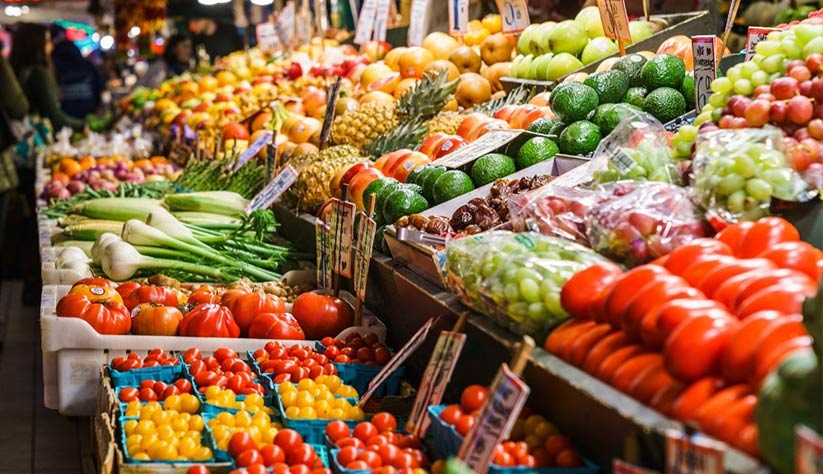
So how do you pick the right type of low-fat diet for diabetes? Well, fortunately, we've spent decades perfecting a diet that hits all of the points above.
Like all low fat diets, it helps you reverse insulin resistance with a rich selection of natural, low-fat foods that also help boost your heart health and lose weight.
But the most important part is that it's rich in whole carbohydrates that you can eat as much of as you want, to stay energized and full of life with fun flavors.
Here's a few characteristics of this strategy:
High in Plants
Most important (apart from being low-fat) is an emphasis on plant-based eating. Low-fat diets often have a bad reputation for being "boring," but the truth is that they don't need to be! Low fat doesn't mean low flavor.
In fact, our recommended diet includes vegetables and fruit at every meal, plus an altogether emphasis on plant foods in general - whole grains like intact barley or quinoa, legumes like lentils, beans, peas, and chickpeas.
And it doesn't mean you can't have fun either! You may not have known it, but there are some pretty amazing plant-based, fat-free salad dressings, spices, and flavorings that pack an incredible kick without negatively affecting your health.
Choose Whole Foods
Another big point is to choose whole foods. Whole food is food that hasn't been processed or refined and is instead something you might find in nature.
For example, a whole grain like barley would be considered "whole," as it hasn't been processed at all to remove things like the germ and bran that are rich with fiber and nutrients.
Similarly, for fruits and vegetables - they're fresh foods that haven't been "processed" in any way, and you can either eat them raw or cooked.
Whole Grains Are Your Friend!

And contrary to many suggestions, whole grains don't have to be boogeymen! In fact, they're a great place to get the nutrients and fiber you need, in a digestible form that can also be delicious.
But make sure they are WHOLE - not refined or processed into white flour! Low-fat diets encourage whole grain choices like barley, brown rice, quinoa, amaranth, and whole wheat.
And in fact, we recommend that you eat whole grain every day!
Avoid Artificial and Processed Foods
And on the flip side, that means avoiding artificial and processed foods. Low-fat diets encourage the consumption of whole, natural foods like vegetables and fruit, but they also help avoid artificial sweeteners (like aspartame) or "fake" fats that are made by manufacturers to be low in calories yet high in taste - such as margarine.
So it's a good guess that brightly packaged foods (even if they scream "low-fat!" or "fat-free!" at you), aren't going to be the right decision.
Don't Fear Fruits

Another misunderstood boogeyman for people living with diabetes is fruit, but fruit can actually be great for you! Low-fat diets encourage the consumption of fruit, just like vegetables.
And here's why: Low-fat doesn't mean "no sugar" - it means finding natural sugars that are healthy and nutritious! And your body actually needs those nutrients to function well, including fruits rich in vitamin C or potassium.
If you have extremely high insulin resistance, it may be smart to be wary of fruits at first, but in the long term, fruits should be a staple of your diet!
Why Meat May Not Be The Right Decision
And while we know meats can be hard to give up, we recommend avoiding or at the very least significantly reducing your consumption.
Unfortunately, meats tend to range from not ideal for you (yep, even lean meats like chicken and turkey breast) to known carcinogens, like processed meats that are full of nitrates, artificial preservatives, and saturated and trans fats.
The one area of meat that has shown some possible benefits for insulin resistance is fatty fish, which are eaten in the traditional Mediterranean and Japanese diets, but much of the research still isn't totally clear there.
Additionally, toxins such as mercury, dioxin, and PCBs are commonly found in unacceptable levels. Click here to learn about further concerns with fish consumption including IGF-1, cholesterol, saturated fat and more.
What About Dairy?
Another question we get frequently is about dairy, and this is another food that we recommend avoiding. Most cream, dairy, and cheese products are loaded with saturated fat, which has been linked to heart disease and other serious health consequences.
And the fact is that dairy products do raise insulin levels. Low-fat diets encourage avoiding or significantly reducing your intake of high-dairy foods like ice cream, butter, and even "low-fat dairy" like cottage cheese or skim milk.
A Few Reasons Against Eggs
And the final common staple we recommend avoiding is eggs. Eggs, even egg whites, are high in cholesterol, which can contribute to heart disease. Our version of a low-fat meal plan encourages avoiding or significantly reducing your intake of eggs.
Anything that you can get from eggs you can actually find in plants, especially nuts, seeds, legumes.
Some Common Questions
Now, this can be a lot to handle (and we'll get to our expert coaches below), so before we wrap up we wanted to address some common questions.
Should I Go Entirely Fat-Free?
The answer here is no, fat-free isn't the answer! Low-fat eating encourages moderating your intake of high-fat foods, but low fat does not mean "no fat!"
After all, many plant-based fats like those from nuts, seeds, and the occasional avocado, can be very healthy for you.
What If I Slip Up?
Don't worry! Low-fat strategies are a lot more forgiving than many other popular "diets" because they encourage moderation, and they're not sacrificing one aspect of your health for another.
Just get back on track and keep going! You're not likely going to erase your progress over one holiday or a stressful busy season, and even if you do, the answer is just to get back on the horse!
As for smaller slip-ups, like going for fatty salad dressings on occasion rather than a low-fat option, or having a little fun on a holiday, aren't going to be a disaster, especially if you're sticking to your strategy. We're all human after all!
What About Alcohol?
To be frank, frequent alcohol use is one of the biggest enemies for people with diabetes. Not only is it high in sugars, and can cause blood sugars to rise quickly, but it can also have serious long-term consequences for blood sugar control.
We don't recommend drinking alcohol on a regular basis if you're trying to manage your diabetes at all. But one drink every so often may be fine in moderation (definitely no more than three or four alcoholic beverages per week).
What About Meat Substitutes?
That depends on the type of meat substitutes! If you're sticking to fresh, plant-based, whole foods like jackfruit or durian, then go for it! If you're sticking to processed soy products, then we recommend avoiding them.
There are plenty of plant-based choices that can help you get more protein without eating meat substitutes at all. And if you do want a quick and easy way to add some extra flavor or texture while getting more protein, we have a number of ideas on our recipes page!
Your New Expert Coaches
We know that keeping all of this straight can be complicated, which is why we're here for you!
Mastering Diabetes isn't just a collection of research. It's an entire community, with a number of coaches who are constantly working to make sure that people with diabetes have support, guidance, and clarity as they work to reverse insulin resistance, reverse prediabetes, reverse type 2 diabetes in the vast majority of cases and take back full control in the case of type 1 or type 1.5 diabetes.
There's a reason that so many people are sharing their "A1c Miracle" -- and it's because not only does the method work, but we have the people to help you make it work for you.
Lower Your A1c and Get to Your Ideal Body Weight ... Guaranteed

Your results are guaranteed. Join more than 2,000 members today
Personalized coaching puts you in immediate control of your diabetes health, helps you gain energy, improves your quality of life, and reduces or eliminates your meds.


